|
|
|
Sort Order |
|
|
|
Items / Page
|
|
|
|
|
|
|
| Srl | Item |
| 1 |
ID:
187111
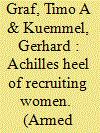

|
|
|
|
|
| Summary/Abstract |
The German Bundeswehr, like other NATO forces, seeks to recruit more women in order to improve its gender balance and to meet its personnel needs. However, previous research on military recruitment has paid little attention to women. Given that the (German) military is still a male-dominated organization, we argue that women’s opinion regarding the realization of gender equality in the military may very well be the Achilles heel of recruiting women. Based on the assumption that women value gender equality in the work environment, we test the hypothesis that women are more attracted to the military as a (potential) employer, the more they think the military has achieved gender equality. A multivariate analysis of nationally representative survey data from Germany from 2019 provides empirical evidence to support this hypothesis. Practical and theoretical implications are discussed.
|
|
|
|
|
|
|
|
|
|
|
|
|
|
|
|
| 2 |
ID:
187106
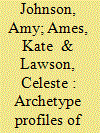

|
|
|
|
|
| Summary/Abstract |
Military spouses are situated at the junction of the military and civilian worlds. They provide necessary support to military strategic and operational objectives and are also expected to perform a traditional spousal role of the ‘good’ military wife. This article demonstrates the existence of strong military partner archetypes which guide military community norms and expectations of spousal behaviour. In 14 qualitative interviews and five focus groups with Australian military partners, participants revealed many different, yet firm, sentiments related to identity, including fierce independence; a sense of belonging; self-reliance; a desire to help others; belief in fairness and pragmatism. The archetypes outlined in this article shape how partners see their role, and how they interact with other non-military partners and the military organization. This research delivers insights into optimizing military partner services to better support spouses through deployment, relocation and other military experiences.
|
|
|
|
|
|
|
|
|
|
|
|
|
|
|
|
| 3 |
ID:
187110
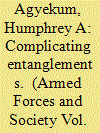

|
|
|
|
|
| Summary/Abstract |
Scholarly debates on civil–military relations often focus on how the military impacts society. Adding to the vast literature of civil–military relations, this article examines how socio-cultural practices and societal developments in the host society affect the military. Based on long-term ethnographic engagement with the Ghana Armed Forces, the piece presents empirical observations of how culturally informed practices, such as begging via proxies (djuan toa), infiltrate the Ghanaian military barracks and affect the institutions’ functioning. The article illustrates how two additional elements, skewed recruitment practices and the politicisation of the rank and file, are used as tools by political factions, such as Ghana’s two most prominent parties (the New Patriotic Party and National Democratic Congress), seeking to gain control over the Ghanaian military. The article analyses how these approaches contribute to undermining the armed forces’ discipline and military professionalism and consequently affect the military institution as a whole.
|
|
|
|
|
|
|
|
|
|
|
|
|
|
|
|
| 4 |
ID:
187112
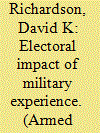

|
|
|
|
|
| Summary/Abstract |
The belief that a military veteran candidate receives an electoral benefit at the polls based on a history of military service remains a widely held assumption in American politics. However, this assumption of a veteran electoral bonus has rarely been studied by scholars and the limited literature displays mixed results. This article presents the findings of a new study that addresses the mixed results in the literature and presents evidence that demonstrates that certain types of military veteran candidates do gain a veteran bonus in congressional elections. This advantage over nonveterans is conditioned by party, the type of race, and the nature of military service. By analyzing general election races for the United States Senate over 34 years (1982–2016), the study uncovers support for Democratic candidates with military service receiving an electoral bonus at the polls. This electoral bonus is most widely enjoyed by Democratic veterans in open Senate races and with experience in deployed warzones. The key findings suggest that previous conclusions in the literature with respect to establishing a veteran bonus in congressional elections should be reexamined to expand the time period of analysis, restructure the characterization of military experience beyond a binary variable, and include both House and Senate elections.
|
|
|
|
|
|
|
|
|
|
|
|
|
|
|
|
| 5 |
ID:
187113


|
|
|
|
|
| Summary/Abstract |
The presumed “gap” in fundamental foreign policy beliefs between what Huntington (1957) described as “liberal society” and the “conservative military mind” lies at the core of research on civil–military relations. However, we still know surprisingly little about the precise nature of differences between the two groups’ core foreign policy orientations. This study presents the first empirically grounded evaluation of the public–military gap. We deployed a unique survey to directly compare the views of 470 active-duty US military officers against a representative sample of the American public. Our study included beliefs concerning the appropriate role of military force and of US engagement in global affairs, the likely direction of US national security in the coming decade, and the causes and costs of future military conflicts. While we confirm aspects of Huntington’s dichotomy, we also observe critical differences between the two groups that diverge from the traditional conceptualization of a “civil–military gap.”
|
|
|
|
|
|
|
|
|
|
|
|
|
|
|
|
| 6 |
ID:
187109
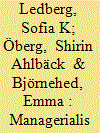

|
|
|
|
|
| Summary/Abstract |
This article analyzes civil–military relations and the issue of civilian control through the lens of new managerialism. It illustrates that the means and mechanisms applied by governments to govern the military actually shape its organization and affect its functions in ways not always acknowledged in the civil–military debate. We start by illustrating the gradual introduction of management reforms to the Swedish Armed Forces and the growing focus on audit and evaluation. The article thereafter analyzes the consequences of these managerialist trends for the most central installation of the armed forces–its headquarters. It further exemplifies how such trends affect the work of professionals at the military units. In conclusion, managerialist reforms have not only changed the structure of the organization and the relationship between core and support functions but have also placed limits on the influence of professional judgment.
|
|
|
|
|
|
|
|
|
|
|
|
|
|
|
|
| 7 |
ID:
187108


|
|
|
|
|
| Summary/Abstract |
This article examines the experiences of newly graduated officers and specialist officers, as they recently entered employment in the Swedish Armed Forces. Building on 35 interviews, this article illustrates the dynamics of excessive workload and an unstructured working environment, and how embedded strategies for mentoring and guidance can reduce negative outcomes associated with the workload. The article introduces the concept of career time, reflecting the participant’s propensity to perform unpaid work to pursue a career in the organization. This study reveals tensions between organizational and employee interests, and experiences of exclusion from the officer profession, contextualized drawing on classical theorists Foucault and Habermas. When restructuring organizations, the quest for efficiency can outweigh professional values, such as esprit de corps and taking pride in work and professional identity.
|
|
|
|
|
|
|
|
|
|
|
|
|
|
|
|
| 8 |
ID:
187104


|
|
|
|
|
| Summary/Abstract |
Given that the U.S. military uses science, technology, engineering, and math (STEM) exposure as a key recruitment tool, one should expect that military service is associated with STEM outcomes. While research demonstrates this pattern for women veterans, we know little about racialized and intersectional patterns. This article uses the American Community Survey data (2014–2018) to examine the association between military service, race/ethnicity, and gender to STEM degrees earned. We find that military service operates contingently: White men’s plus white, Hispanic, and multiracial/other women’s predicted probability of earning a STEM degree increases with military service. In contrast, for other minority groups, military service is not associated with a higher predicted probability of earning a STEM degree. Indeed, for groups typically overrepresented in STEM fields (i.e., Asian veterans), a negative association exists. These findings inform extant research on the long-term impact of military service on civilian reintegration, including educational and occupational outcomes.
|
|
|
|
|
|
|
|
|
|
|
|
|
|
|
|
| 9 |
ID:
187107


|
|
|
|
|
| Summary/Abstract |
Decades of research have established transformational leadership as an encompassing leadership approach with broad applications across organizational contexts. Despite dozens of meta-analyses and many empirical studies demonstrating the direct performance effects of transformational leadership, ways in which transformational leaders shape follower personal development and well-being remain largely unexplored, particularly in extreme contexts such as military combat. Based on a sample of 130 combat veterans of multiple conflicts, we examined the impact of transformational leadership in combat on follower posttraumatic growth and follower self-efficacy after deployment, including the moderating effects of the duration and intensity of combat. Moderated regression modeling and analyses demonstrated that transformational leadership was associated with follower posttraumatic growth among lengthier combat deployments, as well as with follower self-efficacy independent of combat duration and intensity. Our findings suggest that transformational leaders frame extreme contexts as opportunities for growth, and further implications for research and practice are discussed.
|
|
|
|
|
|
|
|
|
|
|
|
|
|
|
|
| 10 |
ID:
187102
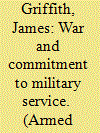

|
|
|
|
|
| Summary/Abstract |
The present study examined career intentions in two samples—home-based or garrison (N = 12,583 soldiers in 180 companies) and deployed and recently returned soldiers (N = 4,551 in 50 companies). Proportionally, fewer deployed soldiers than home-based garrison soldiers intended to stay in reserve military service. Among deployed soldiers, those who reported having experienced combat trauma, having had wounded or killed someone, and having had a friend killed in combat were less likely to plan to continue military service; reservists more likely to continue military service had returned to the same civilian job after deployment. Among deployed and garrison soldiers, fewer financial difficulties were associated with higher likelihood of continuing reserve military service. Examples from the social constructionist perspective of reserve military service are used to elaborate on mechanisms in these associations.
|
|
|
|
|
|
|
|
|
|
|
|
|
|
|
|
| 11 |
ID:
187105
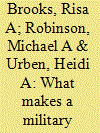

|
|
|
|
|
| Summary/Abstract |
Scholars have contended that norms of professionalism are critical to understanding how militaries interact with civilian leaders and when they intervene in politics. Yet, few studies have directly examined the normative structures of military officers. Through a survey of 1468 US Military Academy cadets, this study evaluates cadets’ views toward professionalism, and in particular what is often presumed to be the dominant framework of those norms based on Samuel Huntington’s The Soldier and the State. We identify five patterns of normative beliefs based on cadets’ views of civil–military interaction and the nonpartisan ethic: orthodox, unorthodox, inconsistent, non-committal, and motivated norms. Cadets fall into each of these categories, but approximately one-quarter demonstrate motivated norms, adhering when convenient, and otherwise dispensing with them when the rules they prescribe clash with their partisan identities. These findings, especially our novel conceptualization on norm adherence, contribute to a greater understanding of military culture and professionalism.
|
|
|
|
|
|
|
|
|
|
|
|
|
|
|
|
| 12 |
ID:
187103


|
|
|
|
|
| Summary/Abstract |
An aging veteran population with a median age of 65, their inferior health status, and the rapidly growing number of women veterans propel veterans affairs (VA) hospitals to provide a wide range of nursing services. However, despite the significant roles of nurses and chronic nurse shortages in VA hospitals, there has been little research on the determinants of nurse turnover in the VA healthcare system. This study analyzed registered nurse turnover rates at a panel of 118 VA hospitals from 2015 through 2017 and found that nurse turnover is significantly influenced by patient mortality, job satisfaction, annual salary level, and preventable hospitalizations. These findings suggest that VA hospitals should maintain proper nurse workloads and implement programs that can improve nurses’ stress level and job satisfaction.
|
|
|
|
|
|
|
|
|
|
|
|
|
|
|
|
|
|
|
|
|